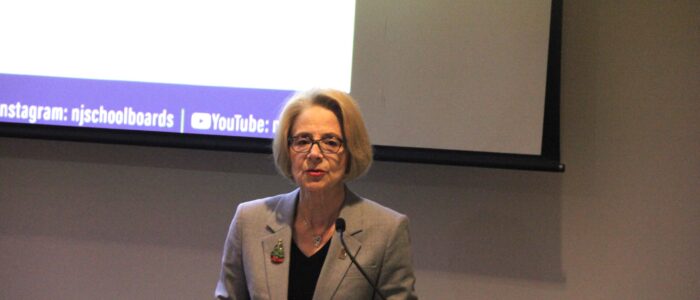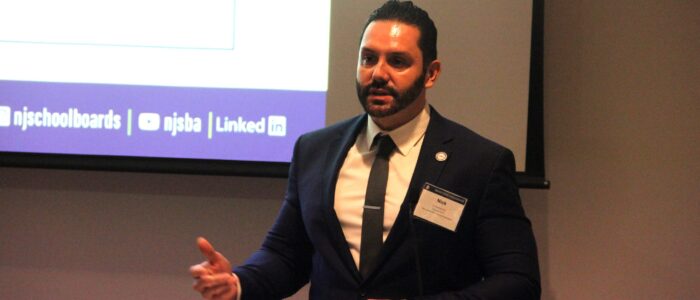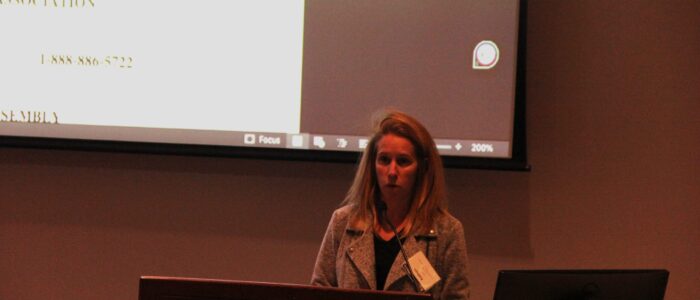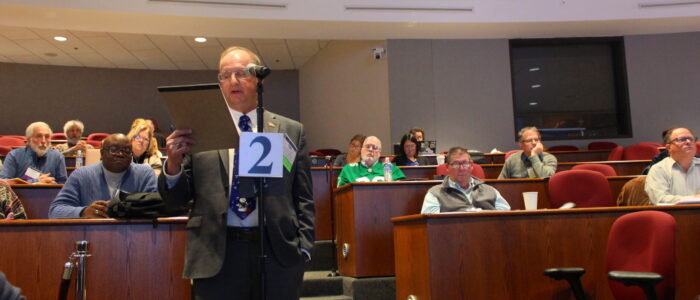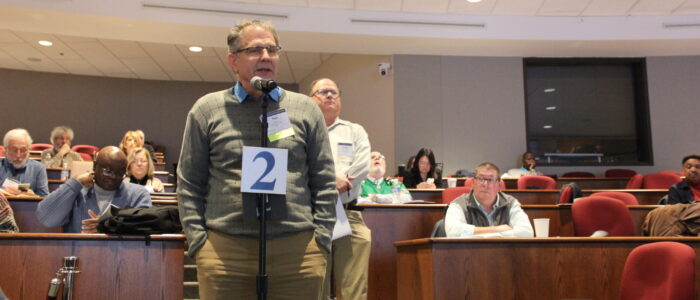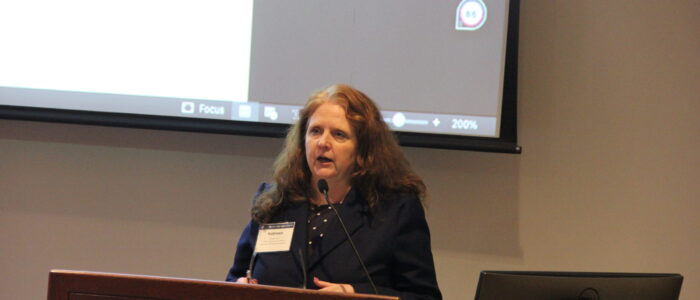Scores of board members from throughout the state gathered for the New Jersey School Boards Association’s semiannual Delegate Assembly on Saturday, Dec. 7, to consider seven resolutions.
Karen Cortellino, M.D., president of the NJSBA, acknowledged the Association’s officers, who were all present at the meeting at The Conference Center at Mercer in West Windsor, as well as the commitment of board members who spent their Saturday morning to help advance the education of children.
Her remarks focused on the array of resources the NJSBA offers to new board members, which was fitting given that many boards are gearing up to swear in newly elected board members.
“Just like you, these soon-to-be board members are passionate about advancing the education of children,” she said. “You have so much to teach them, and I encourage you to lend a helping hand as they learn what it means to be an effective school board member.”
Dr. Timothy Purnell, executive director and CEO of the NJSBA, thanked attendees for their service to their local communities before delivering a comprehensive report highlighting how the Association is tirelessly working on behalf of its members.
For instance, in a bid to help the Association make progress in all three of its pillars – content, connection and advocacy – the NJSBA recently launched a new and improved website – a project that was a year in the making.
The NJSBA team “did a deep dive,” analyzing how members used the website and how the Association could serve them better as they work. The new website “is more intuitive and based on what members are looking for,” he said, adding that it includes curated topics, an enhanced search bar and a variety of other useful features.
The Association, however, has a variety of other undertakings in the works that promise to help boards of education achieve their goals, he said.
For instance, in January, the NJSBA will debut a new and improved self-evaluation tool that boards of education can utilize. The Association will also introduce a revamped Board Member Orientation Program – one that will include additional small group opportunities.
Purnell praised the numerous boards of education who have earned Board Certification throughout the year and highlighted the work the Association does with a variety of partners.
Another topic he touched on was the NJSBA Connection platform, which is an online community that continues to grow. Already, it has more than 4,900 members.
“Next month, we will launch a board president Connection group, so you can share and talk with board presidents throughout the state,” he said. “We are also launching a new board member section and certified board leader section, so those members can share their experiences.”
Workshop 2024 and the Fall School Law Forum were a resounding success, Purnell said, noting that it was an organization-wide effort. “I am not sure how we will be able to top it this year, but we will make our best effort,” he said.
Another forthcoming added benefit to members will be a quarterly newsletter, Capitol Watch, which will highlight the advocacy efforts of the Governmental Relations Department. The Governmental Relations team is currently tracking more than 1,700 bills that could potentially have an impact on New Jersey schools, he said.
Next, Purnell introduced Dr. Nicholas Diaz, who was attending his first Delegate Assembly as deputy director.
Diaz shared some insights into his background as the former shared superintendent at Franklin Township School District and Union Township Schools in Hunterdon County as well as his time as superintendent at Frelinghuysen Township School District in Warren County; principal and district technology articulator for Manville School District in Somerset County; and an assistant principal at Somerville schools, also in Somerset County.
Since joining the Association on Oct.1, he has made it his mission “to listen and learn,” he said. “I have been meeting with all our staff members to learn how I can support them,” he said. “Externally, Dr. Purnell and I will visit county board members and learn directly from you what your priorities are.”
Resolutions
Chanta L. Jackson, vice president for legislation and resolutions, presided over the resolutions portion of the meeting.
The Association received 19 resolutions prior to cutoff date, but one was not consistent with filing requirements and two were withdrawn, she said. Of the 16 resolutions considered by the Resolutions Subcommittee, seven were removed and two were combined with similar resolutions.
The Resolutions Subcommittee chose to support six of the seven resolutions and declined to support one. Pursuant to the Association’s bylaws, all seven were brought to the delegates for a vote.
Resolution: The Resolutions Subcommittee’s Report
The Lopatcong Township Board of Education in Warren County proposed revised language to the NJSBA bylaws, setting forth a specific timeframe within which the Resolutions Subcommittee must submit its report to local boards of education.
The Resolutions Subcommittee recommended approval of the resolution with the following substitute resolved clause for inclusion in NJSBA’s bylaws, which would create additional language to be included in Article V, Section 3, Paragraph a.:
As long as permitted by business demands, the Resolutions Subcommittee shall prepare a report and submit it no less than 21 days in advance of each meeting of the delegates to each local board of education.
Kathy Whalen, legal counsel/HR at the NJSBA, discussed the background of the resolution as well as the research conducted by the Resolutions Subcommittee, noting that Lopatcong was agreeable to the subcommittee’s suggested changes, which included “as long as permitted by business demands” to recognize that strict compliance with the resolution may, at times, be difficult.
“The NJSBA is committed to always trying to provide the Resolutions Subcommittee report to local boards of education in as far as advance as possible,” Whalen said.
The resolution was approved.
Resolution: Board Meeting Notices
The next resolution also came from the Lopatcong Board of Education.
It proposed new policy language to be incorporated into the NJSBA Manual of Positions and Policies on Education, supporting the publication of board meeting notices electronically, rather than publication in two newspapers as is currently required by law.
The Resolutions Subcommittee recommended approval of the resolution with the following substitute resolved clause that would create additional policy language to be included in NJSBA’s Manual of Positions and Policies on Education at File Code 9321:
The NJSBA believes that boards should be permitted to publish all public meeting notices and requisite reference materials through electronic media in lieu of publication in physical newspapers as required pursuant to the Open Public Meetings Act or any other law or regulation requiring public notification of a meeting of the board, including but not limited to, regular meetings, special meetings and public hearings.
Carl Tanksley Jr. discussed the research the Resolutions Subcommittee conducted in reviewing the resolution and noted that the NJSBA has a long history supporting this type of action. He observed that the timing of the resolution was fortuitous given that the Star Ledger family of newspapers recently announced its publications would be transitioning to digital only.
The resolution was approved.
Resolution: Attendance Regulations Related to Military Activities
The Kittatinny Board of Education in Sussex County proposed new language to NJSBA’s Manual of Positions and Policies on Education supporting the belief that attendance regulations should include a state-excused absence for students who are completing procedural steps necessary for enlistment in the United States military. The resolution indicated that military service by young persons is paramount to the continuation of a free and independent society, and certain requirements for enlistment require these students to be absent from school. As such, students should have the opportunity to complete military enlistment requirements without the fear of violating local attendance and graduation requirements resulting from such absences.
The Resolutions Subcommittee recommended approving the resolution with the following substitute resolved clause that would create additional policy language to be included in NJSBA’s Manual of Positions and Policies on Education in File Code No. 5113 – Attendance Policies:
The NJSBA believes the New Jersey Department of Education student attendance regulations should include a limited number of state-excused absences per school year for students who seek to participate in activities related to military enlistment that require absence from classroom instruction.
Kimberly Gatti, director of policy at NJSBA, highlighted the Resolutions Subcommittee’s research, noting that the Association believes that supporting non college bound learners is as important as supporting students headed to college. She observed that schools already excuse certain absences for college visits.
The resolution was approved.
Resolution: PILOT Agreements
The Verona Board of Education in Essex County proposed replacement language to the NJSBA Manual of Positions and Policies on Education, File Code No. 3210 – Local Funds, indicating: In all new PILOT agreements between municipalities and developers, the funds paid to the municipality shall be shared with the school district at the same proportional rate as a taxable property. In all new PILOT developments that potentially increase enrollment in a school district, the superintendent or their designee shall be a member of the negotiation committee with equal rights and decision-making authority with regard to the educational space and possible payment toward the community benefit to the students in any agreement.
A similar resolution was filed by the Plainfield Board of Education, and pursuant to NJSBA bylaws, the Resolutions Subcommittee incorporated a portion of its resolution into the following substitute resolved clause that would create additional language at File Code No. 3210 – Local Funds, as follows:
The NJSBA believes that municipalities should be required to include the board of education in the consideration and development of any payment-in-lieu of taxes (PILOT) agreement that has the potential to increase student enrollment. The NJSBA further believes that the board of education should be a member of the municipal negotiation committee with equal rights and decision-making authority to provide input and receive appropriate portion of community benefits.
Charles Muller, business administrator in residence at NJSBA, explained the rationale behind the Resolutions Subcommittee’s recommendation.
The resolution was approved.
Resolution: Financial Literacy
The Plainfield Board of Education in Union County proposed revised language to be added to NJSBA’s Manual of Positions and Policies on Education, File Code No. 6142 – Subject Fields, expanding financial literacy curriculum requirements to include education on generational wealth, focusing on strategies for wealth creation, preservation and transfer to future generations, as well as addressing historical barriers to wealth accumulation.
The Resolutions Subcommittee recommended approval of this resolution with the following substitute language that would create additional policy language to be included in NJSBA’s Manual of Positions and Policies on Education in File Code No. 6142 – Subject Fields, under Curriculum – General:
The NJSBA believes that local boards of education should exercise existing statutory authority to develop curricula that are aligned to educational standards and reflect the diversity and distinct needs of all students residing in their communities.
Gatti addressed the delegates to explain the research the Resolutions Subcommittee conducted and why it supported the resolution.
The resolution was approved.
Resolution: Naming of Schools
The Plainfield Board of Education also proposed new policy language in the Community Relations Policies section of the NJSBA Manual of Positions and Policies on Education. The resolution stated as follows:
The NJSBA believes that the New Jersey Department of Education, in collaboration with local school districts, should conduct a comprehensive review of all public schools named after individuals who owned slaves or supported slavery, and to initiate the process of renaming school in favor or names that reflect values of inclusivity, equality and historical justice.
The Resolutions Subcommittee declined to support the resolution.
Vincent Delucia, director of special projects at NJSBA, highlighted the work the Resolutions Subcomittee engaged in while researching the resolution. He noted that throughout its history, NJSBA has advocated for “local control,” which guided its discussion of the resolution.
The resolution failed to pass.
Resolution: Curricula and Diversity
The Plainfield Board of Education also submitted a resolution proposing new policy language to be added to NJSBA’s Manual of Policies and Procedures of Education – File Code No. 3220 – State Funds, providing that the state should establish state-funded programs dedicated to reparative education in urban districts, with a focus on addressing historical injustices affecting marginalized communities through initiatives such as scholarships, mentoring programs and restorative justice workshops.
The Resolutions Subcommittee recommended approving the resolution with the following substitute resolved clause that would create additional policy language to be included in NJSBA’s Manual of Positions and Policies on Education in File Code No. 6142:
The NJSBA believes that local boards of education should exercise existing statutory authority to develop curricula that reflect the diversity and distinct needs of all students residing in their communities and supports state educational standards while allowing districts the flexibility to address student developmental needs, including local history and other community-specific issues into the learning experience aimed at fostering academic success, social equity and emotional well-being.
Kathleen Asher, director of legal and labor relations at NJSBA, highlighted the research the Resolutions Subcommittee conducted in reviewing the resolution.
The resolution was approved.
